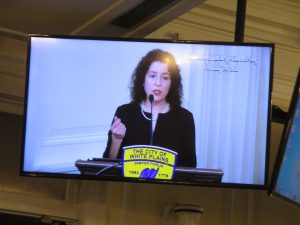White Plains Mulling Five-Cent Paper Bag Fee

The White Plains Common Council is considering legislation to charge five cents for paper bags provided by stores.
Mayor Tom Roach explained at the Feb. 24 Common Council meeting why he thought the paper bag fee is needed. “Paper bags have a bigger carbon footprint than plastic bags,” Roach said. “The goal is to have shoppers use reusable bags.”
Karen Pasquale, senior advisor to Roach, said in 2019 the state Legislature passed the Bag Waste Reduction Act with the goal of reducing the use of plastic in the waste stream, including the encouragement of the usage of reusable bags. “It was pretty significant legislation,” she said.
Beginning on March 1, with some exceptions including vegetable, dry cleaning and newspaper bags, plastic bags cannot be provided to shoppers, Pasquale said. Plastic bags are “detrimental to the environment and wildlife,” she said. “These bags, as we know, don’t biodegrade.” Petroleum used to create plastic bags creates greenhouse gas emissions, she said.
Pasquale said the state under the legislation allows counties and cities to impose a five cent fee on carry out paper bags. Paper bags produce toxic chemicals during their creation and are not reused as much as plastic bags, she said Cities and counties that charge five cents per paper bag can keep 40 percent of the fees with the rest going to the state, she said. The 40 percent that would be given to the city would be used to purchase and distribute reusable bags with priority given to low and fixed income communities, she said.
If Westchester County chooses to impose a five cent fee on paper bags the law would not affect cities that enact the paper bag fee, meaning those shopping in White Plains would pay no more than five cents per paper bag, Pasquale said.
If the Common Council chooses to impose the paper bag fee it would go into effect on June 1, Pasquale said.
Council President Nadine Hunt-Robinson said she was concerned that if the five cent per paper bag fee was enacted it would hurt low income communities, which use plastic bags for more than carrying items out of a store such as packing lunch or for use in garbage pails. “I’m always concerned about a working people’s tax,” if bags are not provided for free to residents with low incomes, she said. Pasquale said the new state law prohibits the distribution of most plastic bags. Individuals can bring plastic bags to stores to carry out the items they purchase, but stores cannot provide free plastic bags as of March 1, she said. The state law has provisions to protect residents who receive nutrition benefits from paying the five-cent fee, she said.
Councilman Justin Brasch suggested that some of the money collected by the city if it imposes the paper bag fee be used to purchase reusable bags for low-income persons who do not qualify for nutrition programs. Pasquale said the city would consider his idea.
Roach said work on the legislation would continue.
